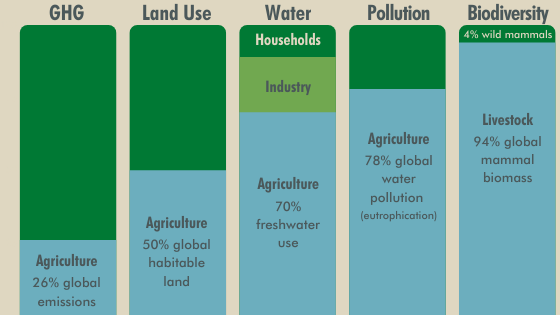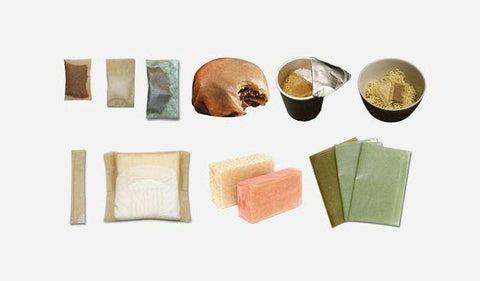
What you need to know: 4 Reasons for Why What We Eat Affects the Environment
We all know about climate change, of course, that big hairy problem that continues to stare us in the face no matter how hard we try to ignore it. As individuals, the question that still stands is how can I, as one person, make a difference? We're offering you one place to start: on your plate.
The links between the food we eat and how those choices affect the environment run deep. Overall, industrialized farming practices cost the environment some $3 trillion per year, according to Trucost. To put that in perspective -- the environmental cost is more than the UK’s annual GDP (!!).
What are the major issues with the way we eat today, and how does what we eat affect the environment? We break it down into four main issues (note that yes, there are many more than four...)

1. Land use - half of our habitable land on Earth is used for livestock and farming, which is a major threat to biodiversity. Remember the Amazon fires? Of course, you do. Much of what was to blame was the amount of rainforest that had been cleared for agriculture.
Seventy percent of biodiversity loss is driven by agricultural expansion, and 94% of our world’s animals (excluding us) are livestock. If that doesn’t shock you, you need to re-read that sentence. Emissions from land-use change and deforestation are one of the biggest contributors to greenhouse gas emissions across the supply chain. Livestock, not surprisingly, is the biggest contributor here. You heard right, manure management (and ahem, cow farts) are two big emitters.

2. Resource use - we use 70% of the world’s fresh water for farming. That’s a huge one. But on top of it, we use petroleum to transport our food, fertilizers to grow our food, and energy to process our food - all of this adds up.

3. Pollution - 78% of freshwater and ocean pollution is caused by agriculture, mainly the use of fertilizers, livestock manure and pesticides. Not only are we polluting our waterways, but we’re polluting our air, our land, animals, and people. Antibiotics used in agriculture spread harmful resistant bacteria throughout our system - and it’s estimated the average American might have 43 toxic pesticides found in their bloodstream.

4. Waste - When we waste food, we waste everything that goes into growing our food, as well as causing additional greenhouse gases to be released in the atmosphere. If food waste were a country, it would be the third-largest emitter of greenhouse gases behind the United States and China.
If food, as we've explored, is part of the problem -- it also must be part of the solution.
Want to learn more?
☞ How you can you fight food waste at home

Sources mentioned:
- Trucost
- NRDC
- World Wildlife Fund
- FAO
- Our World in Data

About Pulp Pantry:
Pulp Pantry turns overlooked resources like upcycled vegetable juice pulp into wholesome everyday snacks that make it convenient and delicious to eat more servings of vegetables and fiber.
Our newly launched Pulp Chips are vegetable-based, tortilla style chips made from fresh, upcycled vegetables as the first ingredient. Pulp Chips are a craveable better-for-you, better-for-the-planet snack with up to a full day's serving of fiber in each bag.
Try all of our four delicious flavors: Barbecue, Jalapeño Lime, Classic Sea Salt, Salt n' Vinegar.






